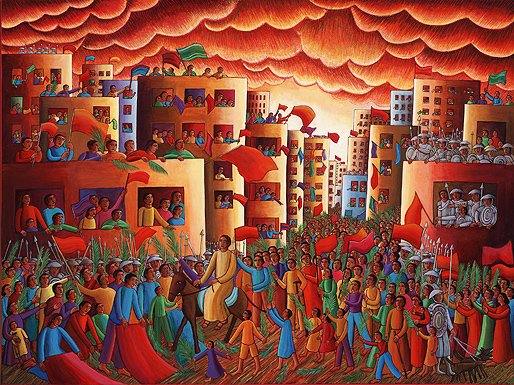The Last Week
A few years ago I read The Last Week: What the Gospels Really Teach About Jesus's Final Days in Jerusalem by scholars Marcus J. Borg and John Dominic Crossan. It made an impression and brought a richness to the Biblical narrative which I knew in a familiar way, but not in its depth. If you have a chance to read this book, I highly encourage you to do so. In one of my churches we used it as a Holy Week Bible study and it was deeply meaningful from Passion/Palm Sunday to Easter Resurrection and all in between.
We are Easter People – knowing the end of the story puts us at a disadvantage. It is hard to feel the pathos, fear and angst of the moments in real time. The Last Week helped me gain a more measured perspective of potential political and religious clashes mixed with societal norms and cultural experiences that are only possible when an Empire subjugates a people. In that vein, some or much of Jesus’ work is about restoring right relationship with God. Often this produced a conflict with Rome and the rationale for his murder by the State, coopted by corrupt Temple authorities.
Recently, I found myself in a meeting with Bishops Palmer and Smith-Malone and the Extended Cabinets of the East and West Ohio Annual Conferences. In our closing time Bishop Malone offered the following words by Bishop Ken Untener. As I heard them, I thought about all of us who know the end of the story relative to the Last Week, but we do not fully know the end of our own stories, because we are living our lives in real time. This piece made me reflect upon the work of the Cross, the Work of the Church, and the work of my life which is centered around Disciple making in the name of Jesus. So what I am suggesting this week is that you read this short reflection, then each day read the lesson for Holy Week, then close with A Future Not Our Own. Allow the text to speak for itself. Allow the text of A Future Not Our Own to interpret the text of scripture into a commentary for your life that you are living in real time – today.
A Future Not Our Own (also known as ‘The Long View’) (Bishop Ken Untener)
It helps, now and then, to step back
and take the long view.
The kingdom is not only beyond our efforts,
it is beyond our vision.
We accomplish in our lifetime only a tiny fraction of
the magnificent enterprise that is God’s work.
Nothing we do is complete,
which is another way of saying
that the kingdom always lies beyond us.
No statement says all that could be said.
No prayer fully expresses our faith.
No confession brings perfection.
No pastoral visit brings wholeness.
No programme accomplishes the church’s mission.
No set of goals and objectives includes everything.
This is what we are about:
We plant seeds that one day will grow.
We water seeds already planted, knowing that they hold future promise.
We lay foundations that will need further development.
We provide yeast that produces effects beyond our capabilities.
We cannot do everything
and there is a sense of liberation in realizing that.
This enables us to do something,
and to do it very well.
It may be incomplete, but it is a beginning, a step along the way,
an opportunity for God’s grace to enter and do the rest.
We may never see the end results,
but that is the difference between the master builder and the worker.
We are workers, not master builders,
ministers, not messiahs.
We are prophets of a future not our own.
Liturgy of the Palms Readings
Liturgy of the Passion Readings
Holy Week Readings
